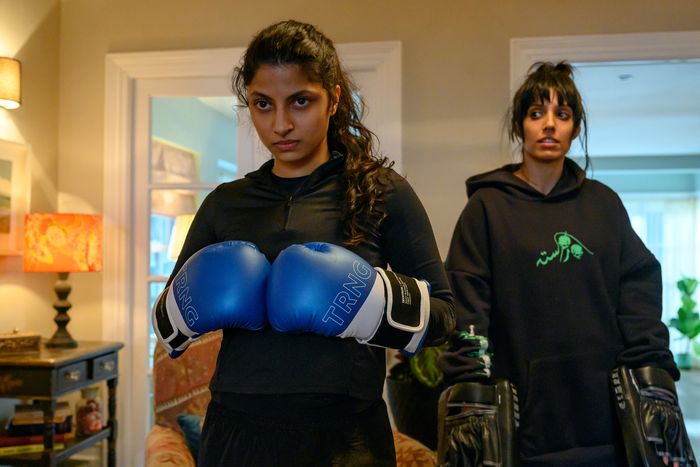
Ria Khan (Priya Kansara), the heroine of Polite Society, is a schoolgirl who dreams of being a stuntwoman. Her elder sister, Lena (Ritu Arya), is on her way to becoming a famous artist — or so Ria keeps insisting despite the inconvenient fact that Lena has dropped out of art school, stopped painting, and is in the midst of a depressive episode that has her squatting in an entryway like Gollum to impulse-eat a whole roast duck. This linking of the siblings’ destinies is the crux of the film, the directorial debut of We Are Lady Parts creator Nida Manzoor. Ria doesn’t just want Lena to succeed — she needs her for solidarity, the Khan sisters against the world, or at least against the expectations entrenched in the London Pakistani community. When Lena starts dating Salim Shah (Akshay Khanna), the most coveted bachelor on the circuit (“He’s not a banker, so he isn’t evil, but he’s still got shitloads of money,” sighs one would-be bride), Ria treats the whirlwind romance like a personal betrayal. Lena isn’t supposed to marry and run off to Singapore, leaving Ria behind, and, more important, she is not supposed to be behaving like a Good Pakistani Girl, leaving Ria alone in her rebellion.
These are complicated feelings for anyone to wrestle with, especially someone in the full flush of teenagerdom, but Polite Society gifts Ria with a stylized approach to contending with them. When she gets into fights with a loathed classmate, with an exasperated Lena, and with Salim’s mastermind of a mother, Raheela (Nimra Bucha), they’re realized as full-on action showdowns involving high kicks, bodies hurled into nearby walls and furniture, and the occasional bit of wirework. These bouts aren’t only taking place in Ria’s head, but they’re decidedly fantastical, the mundane world warping to accommodate the film’s martial-arts-obsessed main character. Finally, all the angst of diasporic existence — the assumptions of upward mobility, the parental pressures, the sacrifices and guilt and the unresolvable issues around assimilation — can be confronted with a straightforward punch to the face. It’s a device that Polite Society can’t entirely pull off, though it’s still a good time.
What Polite Society is doing isn’t new, and its channeling of personal dramas into outrageous battles brings to mind Scott Pilgrim vs. the World, and Kill Bill is an obvious influence on certain stylistic choices and fight sequences. But its more recent spiritual siblings are films such as Everything Everywhere All at Once and Turning Red with their use of genre frameworks to tell stories of intergenerational immigrant pain. Where the Daniels’ film had the multiverse and the Pixar one had panda spirits, Polite Society has a nefarious plan involving genetic engineering and secret experimentation. What it lacks is grandeur and abandon. Its fights never have a martial-arts movie’s commitment — rather than play like real contact happening in a comedic context, they feel like spoofs with the idea of each battle being more compelling than its actual execution. Ria’s big move, the one she keeps having trouble landing, is a flying spin-kick the movie itself never quite seems to figure out the physics of. The sheer joy of watching characters in full bridal splendor preparing to plunge into combat can’t be underestimated, but it’s never as satisfying as it should be.
Instead, the fight scenes come across more like an expression of longing, a desire to break free from the expected rhythms of stories about, say, a teenager growing up in a middle-class British Pakistani family. Like Ria, who can’t seem to convince her teacher on Career Day that she wants to be anything other than a doctor, Polite Society is aware of how its main character is perceived and can’t entirely escape that impression — in part because the dilemmas Ria faces are legitimate, even when they also feel familiar. In Kansara, at least, the film has a winning young lead who isn’t afraid to lean into her character’s impetuous side. As Ria, she ably passes herself off as a budding martial artist and hard-core action-movie fan. But the more impressive stunt she pulls off is re-creating a sense of being young and so overwhelmed by your own emotions that you can act like you’re the only person in the world who has feelings. The scenes between Ria and Lena, who’s dealing with an existential crisis that the sister she’s so close with barely registers, are the movie’s best. Ria is scrappy, determined, and prone to self-dramatizing, but the most endearing thing about her is that she occasionally also gets to be a jerk.
More Movie Reviews
- The Accountant 2 Can Not Be Taken Seriously
- Another Simple Favor Is So Fun, Until It Gets So Dumb
- Errol Morris Has Been Sucked Into the Gaping Maw of True Crime


